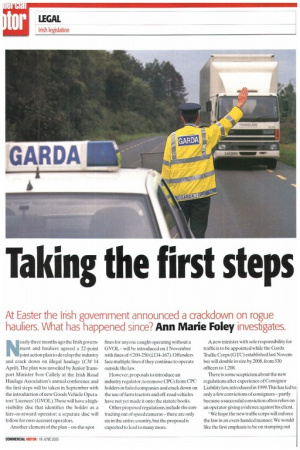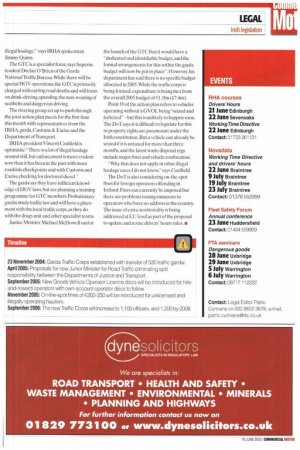Taki g the first steps
Page 40

Page 41

If you've noticed an error in this article please click here to report it so we can fix it.
At Easter the Irish government announced a crackdown on rogue hauliers. What has happened since? Ann Made Foley investigates.
Nearly three months ago the Irish government and hauliers agreed a 22-point joint action plan to develop the industry and crack down on illegal haulage (CM 14 April).The plan was unveiled by Junior Transport Minister Ivor Callely at the Irish Road Haulage Association's annual conference and the first steps will be taken in September with the introduction of new Goods Vehicle Operators Licences' (GVOL).These will have a highvisibility disc that identifies the holder as a hire-or-reward operator: a separate disc will follow for own-account operators.
Another element of the plan— on-the-spot fines for anyone caught operating without a GVOL — will be introduced on 1 November with fines of e200-250 (£134-167). Offenders face multiple fines if they continue to operate outside the law.
However, proposals to introduce an industry regulator, to remove CPCs from CPC holders in failed companies and crack down on the use of farm tractors and off-road vehicles have not yet made it onto the statute books.
Other proposed regulations include the contracting out of speed cameras — there are only six in the entire country, but the proposal is expected to lead to many more. A new minister with sole responsibility for traffic is to be appointed while the Garda Traffic Corps (GTC) established last November will double in size by 2008, from 530 officers to 1,208.
There is some scepticism about the new regulations after experience of Consignor Liability law, introduced in 1999.This has led to only a few convictions of consignors — partly because a successful conviction often relies on an operator giving evidence against his client.
"We hope the new traffic corps will enforce the law in an even-handed manner.We would like the first emphasis to be on stamping out illegal haulage." says IRHA spokesman Jimmy Quinn.
The GTC is a specialist force, says Superintendent Declan O'Brien of the Garda National Traffic Bureau. While there will be special HGV operations, the GTC is primarily charged with cutting road deaths and will focus on drink-driving, speeding, the non-wearing of seatbelts and dangerous driving.
The steering group set up to push through the joint action plan meets for the first time this month with representatives from the IRHA, garda, Customs & Excise and the Department of Transport.
IRHA president Vincent Caulfield is optimistic: "There is a lot of illegal haulage around still, but enforcement is more evident now than it has been in the past with more roadside checkpoints and with Customs and Excise checking for doctored diesel.
The garda say they have sufficient knowledge of HGV laws, hut are planning a training programme for GTC members. Probationary gardai study traffic law and will have a placement with the local traffic corps, as they do with the drugs unit and other specialist teams.
Justice Minister Michael McDowell said at the launch of the GTC that it would have a "dedicated and identifiable budget, and the formal arrangements for this within the garda budget will now be put in place". However, his department has said there is no specific budget allocated in 2005.While the traffic corps is being formed, expenditure is being met from the overall 2005 budget of €1.1bn (£7.4m).
Point 10 of the action plan refers to vehicles operating without a GVOL being -seized and forfeited"— but this is unlikely to happen soon. The DoT says it is difficult to legislate for this as property rights arc paramount under the Irish constitution. But a vehicle can already be seized if it is untaxed for more than three months, and the latest waste disposal regs include major fines and vehicle confiscation.
"Why that does not apply in other illegal haulage cases I do not know," says Caulfield.
The DoT is also considering on-the-spot fines for foreign operators offending in Ireland. Fines can currently be imposed but there are problems issuing summons to operators who have no address in the country. The issue of extra-territoriality is being addressed at EU level as part of the proposal to update and revise drivers' hours rules. •








































































































































































































